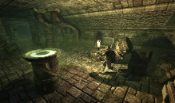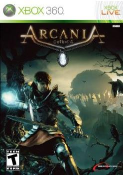Arcania: Gothic 4 Review
|
|
See PixlBit's Review Policies

On 12/12/2010 at 05:11 PM by Stanton Daries While it isn't the Gothic series we know and love, it is still an entertaining story. |

For anyone looking for a generic, classic fantasy RPG to kill some time.
The Gothic trilogy was one of the few distinct fantasy RPG’s to appear in the first decade of this new millennium. While the gameplay was definitely buggy - I remember losing all save files twenty hours into Gothic II - each game immersed you into a cleverly expanding world with a heavy Germanic mythology influence. This series was not cartoony or happy, it was rough and unforgiving. Arcania is the fourth game in the Gothic series, developed by a new team, Spellbound, and while it tries to carry on the traditions and story of the Gothic series, while also refreshing it for a new group of players on the console, it ultimately fails to deliver the necessary experience to attract more followers.

Set ten years after Gothic III, in the land of Myrtana, we find ourselves in the role of a new nameless hero, not to be confused with the nameless hero from the first three games, who seems to actually be living an idyllic life. You’re first challenge is attaining permission to marry the love of your life from her father. When you find out you’re expecting a child from the same woman, it’s apparent that permission was just for the ring. It was at this point that I had to stop the game and make sure I actually had a Gothic game in the drive and not something else.
Of course, my fears were put to rest shortly thereafter, as I found myself back in comfortable RPG territory when destiny raised its head; while you were out the evil soldiers of the evil King Rhobar had burned your village to the ground and killed your wife to be. So evil.

With a quest for vengeance in your heart, you set off to find a magical source of power to take down the king. And boy, are we talking a quest; the people of this world have apparently lost any source of charity or desire to do anything on their own. You can’t walk five feet without meeting someone who will gladly give you some money, item, or piece of vital information - if you can just fetch them some mead or kill that troll terrorizing the countryside.
Unsurprisingly, these quests can be rather annoying and you find yourself contemplating murder of innocents just a little too readily in the game. As aggravating as the quests can be there is definitely a good variety of ones to choose from and you will ultimately want to do as many as you can. This game has a limited number of monsters (i.e., experience) in the game for you to find and if you don’t grind through those then the later parts of the central story are all but impossible, especially on the harder difficulties.

To keep you company in this game are the stunning visual effects of the Vision Engine 7, running as the middleware. The environment is rendered excellently, although there tends to be some odd fading moments as things will just blip out at certain ranges. The character models are incredibly detailed and the combat animations are smooth and well-executed. There are almost no loading screens, except for when you teleport or watch one of the FMV sequences.
The sound on the other hand is not quite as consistently good. While the ambient noises and creature effects are fitting and do a good job of setting the atmosphere, the developers only seemed to have spent money on two voice actors; the main character and someone else to do the entire rest of the world, both male and female. Almost any serious moment, including the death of your fiancée, is ruined by the awful voice acting, which adds almost a comical tinge to anything you do.

The gameplay itself is classic Gothic, as you advance in levels you will be able to devote points to various skill trees covering melee, range, and magic. Almost any of the paths is possible to play with though it is best to focus a bit on melee, just in case. Melee combat focuses on a series of button presses that if timed correctly, and with the proper invested skill points, allows you to engage in a series of combo attacks and dodges. While blocking is available it is really only useful against human opponents. You are better off attempting dodges against your more monstrous adversaries. The game nicely warns you before the enemy performs their strongest attack and lets you get out of the way. Ranged and magical attacks are more straightforward, with both aiming and casting not being too complex. Though you have to be careful you don’t find yourself interrupted or your attack is ruined.
The major issue with Gothic 4 is its pedigree. The Gothic series had established a very vivid world and an incredibly unique way of unfolding its history and story to you throughout the three titles in the trilogy. The NPC’s were fun and the protagonist was someone you could embody. This game should be more labeled as “Inspired by Gothic” than actually a Gothic game. While Arcania: Gothic IV fails to live up to the trilogy that preceded it, you will still find this game a great time killer, with a classic fantasy story and world to immerse in, if you enjoyed the others.









Comments